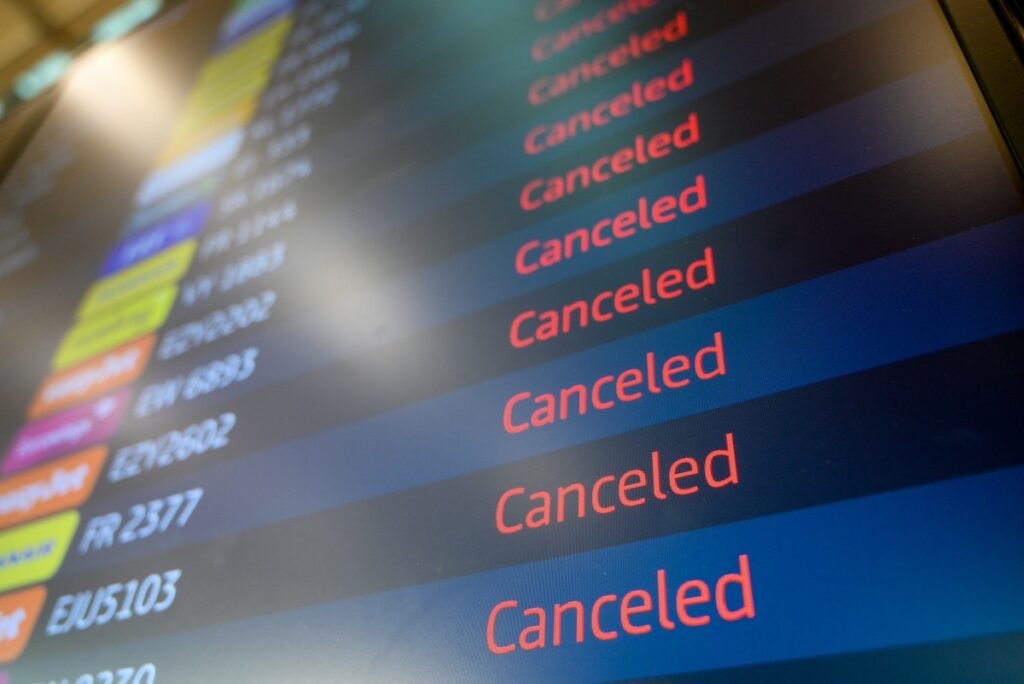In a significant disruption to travel, thousands of flights across Germany were canceled on Monday as workers at several key airports went on strike, grounding a large portion of the country’s air travel network. This industrial action, led by the Verdi union, impacted around 3,400 flights, affecting approximately 500,000 passengers, and came as a result of ongoing labor disputes between airport workers and their employers over pay and working conditions. The strike primarily involved workers from major airports including Frankfurt, Berlin, Munich, Hamburg, and Stuttgart, causing massive disruptions not only for domestic travelers but also for international passengers.
At Frankfurt, Germany’s busiest airport, airport operator Fraport confirmed that no passengers would be allowed to board flights. The action had a ripple effect on international connections, with delays and cancellations affecting both inbound and outbound flights. The disruptions to travel did not stop there. Airports in Bremen, Cologne, Duesseldorf, Hanover, Leipzig, and other cities also faced considerable operational difficulties as workers walked out in a unified call for better pay. The strike action highlights a growing unrest among Germany’s airport service sector workers who are demanding fair compensation for the work they do.

The Verdi union, which represents many public sector employees including those in aviation, has been in collective bargaining negotiations with airport management for months. However, despite these talks, employers have failed to present a satisfactory offer, pushing the union to take drastic steps. Christine Behle, Verdi’s deputy chair, acknowledged the inconvenience caused to passengers but insisted that this strike was necessary to make management understand the seriousness of the workers’ concerns. According to Behle, without the pressure of industrial action, there would be little movement in the negotiations. This frustration has been building for some time, and workers are determined to ensure that their demands are heard loud and clear.
The main demands of the Verdi union center around securing a pay increase of 8 percent or a minimum of 350 euros more per month, alongside additional bonuses for workers in particularly stressful roles. The union argues that these demands are a necessary response to the rising cost of living and inflation, which has put a significant strain on workers’ finances. The workers have expressed their belief that they are not being adequately compensated for the critical tasks they perform, which include handling baggage, assisting passengers, and ensuring the smooth operation of airport facilities. The union’s position is clear: unless their demands are met, further strikes are inevitable.
For the German government, the ongoing strike represents a challenging situation. The public sector negotiations have yet to yield any concrete results, leaving both the workers and employers at an impasse. The absence of a meaningful offer from the government, according to Verdi, has left them with no option but to escalate their actions. With the workers’ demands for better pay and working conditions remaining unmet, the strike has become a pivotal moment in the broader labor movement in Germany. The outcome of this industrial action could have far-reaching implications for future labor relations not only in aviation but across Germany’s service sector.
From a wider perspective, this strike also sheds light on broader labor trends within Europe. The workers’ demands for better compensation and working conditions are reflective of the growing discontent among employees in various sectors who are feeling the strain of economic pressures. The strike has ignited a wider conversation about income inequality, the cost of living, and the role of unions in advocating for workers’ rights. As more industries face similar pressures, the outcomes of such strikes could influence the direction of labor negotiations across the continent.
For passengers and those planning to travel to Germany in the coming weeks, this strike serves as a critical reminder of the vulnerability of the global travel system. Air travel, which has already been burdened by the effects of the pandemic, rising fuel prices, and staffing shortages, is now further strained by labor disputes. Travelers are urged to stay informed about potential disruptions to their flights, remain flexible in their plans, and keep in close contact with their airlines to understand the latest developments. As the strike continues to unfold, it is likely that more flights will be impacted, and passengers may face significant delays or cancellations.
With the summer travel season approaching, the stakes are even higher. This dispute between the Verdi union and airport employers highlights the growing tension in the labor market and the challenges both workers and employers face in meeting their demands. How this situation plays out will not only affect the immediate future of German air travel but may also set a precedent for how labor disputes are handled in the public service sector across Europe.
The longer-term ramifications of this industrial action are significant, particularly for the aviation industry, which relies heavily on the seamless operation of airports to function smoothly. If the strike drags on, it could have a lasting effect on public opinion and the future of labor negotiations in Germany. As the negotiations continue, the government and employers face increasing pressure to resolve the dispute, while workers remain steadfast in their demands for fair treatment.
Stay ahead with the latest news on global innovation, leadership, entrepreneurship, business, and tech. Join us on WhatsApp or Telegram for real-time updates. Have a report or article? Send it to report@theinnovationtimes.com. Follow us on X (Twitter), Instagram, LinkedIn, YouTube, Pinterest, and Facebook for more insights and trends.


